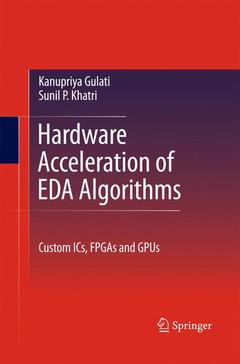Description
Hardware Acceleration of EDA Algorithms, 2010
Custom ICs, FPGAs and GPUs
Authors: Khatri Sunil P, Gulati Kanupriya
Language: English
Subject for Hardware Acceleration of EDA Algorithms:
Approximative price 138.03 €
In Print (Delivery period: 15 days).
Add to cartPublication date: 09-2014
192 p. · 15.5x23.5 cm · Paperback
105.49 €
In Print (Delivery period: 15 days).
Add to cartPublication date: 04-2010
192 p. · 15.5x23.5 cm · Hardback
Description
/li>Contents
/li>Comment
/li>
Provides guidelines on whether to use GPUs or FPGAs when accelerating a given EDA algorithm, with validation by a concrete example implemented on both platforms
Demonstrates the acceleration of several popular EDA algorithms on GPUs, with speedups from 30X to 800X
Presents techniques in a way that the reader can use example algorithms presented to determine how best to accelerate their specific EDA algorithm
Discusses an automatic approach to generate GPU code, given regular uniprocessor code
Includes supplementary material: sn.pub/extras




